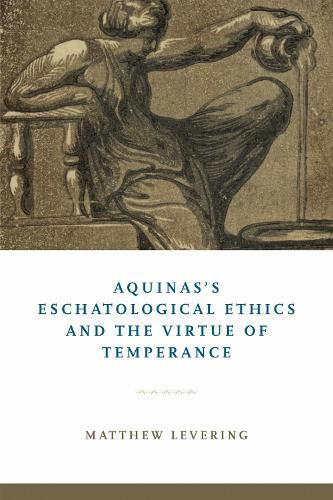Awards
- Winner of Catholic Press Association Book Award: Theology 2019 (United States)
- Winner of Catholic Press Association Book Award: Theology, First Place 2020 (United States)
Overview
In Aquinas's Eschatological Ethics and the Virtue of Temperance, Matthew Levering argues that Catholic ethics make sense only in light of the biblical worldview that Jesus has inaugurated the kingdom of God by pouring out his spirit. Jesus has made it possible for us to know and obey God's law for human flourishing as individuals and communities. He has reoriented our lives toward the goal of beatific communion with him in charity, which affects the exercise of the moral virtues that pertain to human flourishing. Without the context of the inaugurated kingdom, Catholic ethics as traditionally conceived will seem like an effort to find a middle ground between legalistic rigorism and relativistic laxism, which is especially the case with the virtue of temperance, the focus of Levering's book. After an opening chapter on the eschatological/biblical character of Catholic ethics, the ensuing chapters engage Aquinas's theology of temperance in the Summa theologiae, which identifies and examines a number of virtues associated with temperance. Levering demonstrates that the theology of temperance is profoundly biblical, and that Aquinas's theology of temperance relies for its intelligibility upon Christ's inauguration of the kingdom of God as the graced fulfillment of our created nature. The book develops new vistas for scholars and students interested in moral theology.
Full Product Details
Author: Matthew Levering
Publisher: University of Notre Dame Press
Imprint: University of Notre Dame Press
Dimensions:
Width: 15.20cm
, Height: 2.90cm
, Length: 22.90cm
Weight: 0.822kg
ISBN: 9780268106331
ISBN 10: 0268106339
Pages: 446
Publication Date: 15 November 2019
Audience:
Professional and scholarly
,
Professional & Vocational
Format: Hardback
Publisher's Status: Active
Availability: In Print

This item will be ordered in for you from one of our suppliers. Upon receipt, we will promptly dispatch it out to you. For in store availability, please contact us.
Reviews
Matthew Levering examines temperance, a virtue many people might rather avoid than confront. Tempering our daily eating and drinking, our desires, our anger, and more, can seem impossible in contemporary context. Yet by deftly reflecting on scripture and Thomas Aquinas, Levering argues for multiple ways that practicing temperance leads us inexorably toward the kingdom of God. -Jana M. Bennett, University of Dayton Matthew Levering's Aquinas's Eschatological Ethics and the Virtue of Temperance is an extraordinary contribution to Thomistic moral theology and will now serve as the 'go to' book on temperance. The book is utterly scholastic in its modeling of grace perfecting nature, since it explains temperance as accessible to unaided human reason but also shows how temperance in the life of discipleship to Christ is utterly transformed by God's grace. -William C. Mattison III, University of Notre Dame Matthew Levering's study on temperance is an impressive tour through an enormous range of scholarship on the various aspects of this cardinal virtue and its relation to the biblical account of salvation history. Those familiar with Levering's astounding knowledge of theological texts both ancient and modern, and his well-established method of approaching theological topics with careful attention to their treatment in biblical and magisterial sources, will not be disappointed by this latest endeavor. The manner in which Aquinas's Eschatological Ethics and the Virtue of Temperance brings together prominent scholarship in the fields of moral theology, biblical studies, and modern Thomism represents a huge contribution to theological virtue ethics. -Patrick Clark, University of Scranton
Matthew Levering's study on temperance is an impressive tour through an enormous range of scholarship on the various aspects of this cardinal virtue and its relation to the biblical account of salvation history. Those familiar with Levering's astounding knowledge of theological texts both ancient and modern, and his well-established method of approaching theological topics with careful attention to their treatment in biblical and magisterial sources, will not be disappointed by this latest endeavor. The manner in which the book brings together prominent scholarship in the fields of moral theology, biblical studies, and modern Thomism represents a huge contribution to theological virtue ethics. --Patrick Clark, University of Scranton Matthew Levering's Aquinas's Eschatological Ethics is an extraordinary contribution to Thomistic moral theology and will now serve as the 'go to' book on temperance. Levering offers a thoroughly Thomistic account of temperance, which models moral theology robustly informed by eschatology. The book displays a stupendous command of the best and most recent scholarship on Thomistic moral theology, and an extraordinary knowledge of Scripture. Aquinas's Eschatological Ethics is utterly scholastic in its modelling of grace perfecting nature, since it explains temperance as accessible to unaided human reason but also shows how temperance in the life of discipleship to Christ is utterly transformed by God's grace. --William C. Mattison III, University of Notre Dame
Author Information
Matthew Levering is the James N. Jr. and Mary D. Perry Chair of Theology at Mundelein Seminary and co-director of the Chicago Theological Initiative. He is the author or editor of over fifty-five books, including Mary's Bodily Assumption.




